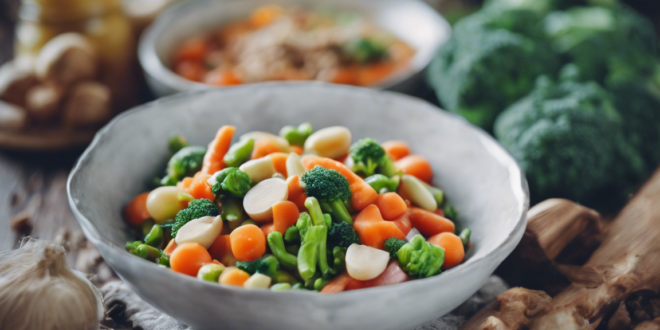Winter Wellness: Expert Nutritional Strategies for Boosting Health with Frozen Vegetables and Comforting Stews
As winter’s chill settles in, maintaining optimal nutrition becomes more critical than ever. Health experts are revealing innovative approaches to transforming cold-weather eating into a powerful strategy for supporting immune function, maintaining energy levels, and combating seasonal health challenges.
Understanding Winter Nutritional Needs
The winter season presents unique dietary challenges that require thoughtful nutritional planning. Our bodies naturally crave more warming, nutrient-dense foods during colder months, making it essential to adapt our eating habits strategically. Nutrition professionals emphasize that winter diet isn’t just about comfort—it’s about comprehensive health support.
The Nutritional Power of Frozen Vegetables
Contrary to popular misconception, frozen vegetables are nutritional powerhouses that often retain more nutrients than their fresh counterparts. Modern flash-freezing techniques preserve vitamins and minerals at peak freshness, providing consumers with high-quality produce throughout the winter months. Registered dietitians highlight that frozen vegetables can be just as nutritious—and sometimes even more so—than fresh alternatives.
Key benefits of frozen vegetables include:
• Consistent nutrient preservation
• Extended shelf life
• Cost-effectiveness
• Convenience in meal preparation
• Reduced food waste
Strategic Spice Selection for Winter Health
Spices are not merely flavor enhancers but potent health allies during winter. Nutritionists recommend incorporating specific spices known for their immune-boosting and anti-inflammatory properties. Turmeric, ginger, cinnamon, and cayenne pepper stand out as winter wellness champions, offering multiple health benefits beyond culinary enjoyment.
These spices provide remarkable advantages:
• Enhanced immune system function
• Improved circulation
• Natural anti-inflammatory effects
• Metabolic support
• Potential disease prevention
Stews: A Nutritional Fortress for Winter Wellness
Stews represent more than just comfort food—they’re sophisticated nutritional strategies disguised as delicious meals. By combining frozen vegetables, lean proteins, and strategic spices, home cooks can create nutrient-dense dishes that support overall health and provide sustained energy.
Ideal stew components include:
• Protein-rich legumes
• Lean meats
• Diverse frozen vegetable blends
• Healing spices
• Bone broth bases
Expert Meal Preparation Techniques
Professional nutritionists recommend batch cooking as a primary winter meal strategy. By dedicating a few hours each week to preparing large quantities of nutrient-rich stews and vegetable-based dishes, individuals can ensure consistent access to healthy meals during busy winter months.
Nutritional Optimization Strategies
To maximize winter nutrition, experts suggest implementing a holistic approach that goes beyond individual ingredient selection. This includes understanding proper cooking techniques, balancing macronutrients, and maintaining dietary diversity.
Recommended strategies include:
• Rotating vegetable varieties
• Experimenting with international spice blends
• Incorporating fermented foods
• Maintaining hydration
• Supplementing with vitamin D
Budget-Friendly Nutrition
Frozen vegetables and strategic spice usage offer economical alternatives to expensive fresh produce. By understanding preservation techniques and purchasing smart, consumers can maintain high-quality nutrition without significant financial strain.
Mental Health and Nutrition
Winter nutrition isn’t solely about physical health—it significantly impacts mental well-being. Nutrient-dense foods and warming meals contribute to mood stabilization, potentially mitigating seasonal affective disorder and maintaining emotional equilibrium.
Practical Implementation
Successfully integrating these nutritional strategies requires gradual, sustainable changes. Start by introducing one new technique weekly, allowing your palate and cooking skills to adapt naturally. Experiment with different frozen vegetable combinations, explore spice profiles, and develop personalized stew recipes.
Conclusion: Embracing Winter Nutritional Wellness
Winter presents a unique opportunity to reimagine nutrition as a proactive health strategy. By leveraging frozen vegetables, strategic spices, and nutrient-rich stews, individuals can transform seasonal eating from a survival mechanism to a vibrant wellness approach.
Remember, optimal nutrition is a journey of continuous learning and adaptation. Consult healthcare professionals, remain curious about nutritional science, and approach winter eating with creativity and intention.
 Good Calories Guide GoodCalories Guide focuses on nutrition, healthy eating, and overall wellness. The site offers practical insights into evidence-based dietary practices, including tips for specific lifestyles such as veganism, keto, and family-friendly meal planning. It also addresses unique nutritional needs for individuals with conditions like diabetes or food allergies, while providing quick and accessible recipes to make healthy living a sustainable and enjoyable choice.
Good Calories Guide GoodCalories Guide focuses on nutrition, healthy eating, and overall wellness. The site offers practical insights into evidence-based dietary practices, including tips for specific lifestyles such as veganism, keto, and family-friendly meal planning. It also addresses unique nutritional needs for individuals with conditions like diabetes or food allergies, while providing quick and accessible recipes to make healthy living a sustainable and enjoyable choice.


